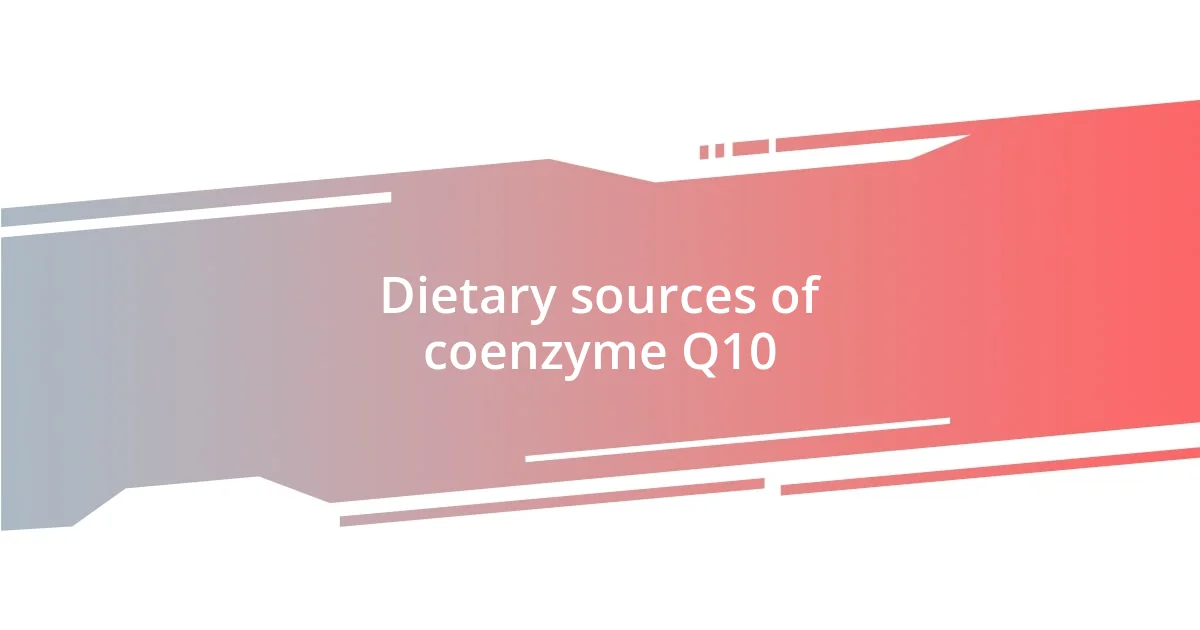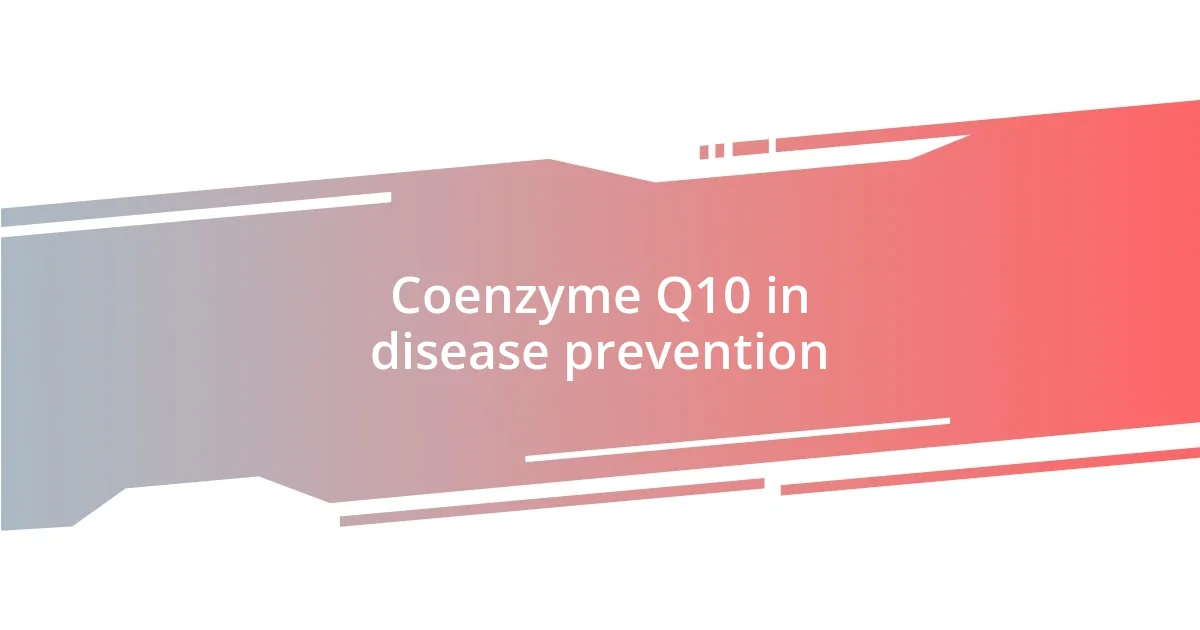Key takeaways:
- Coenzyme Q10 (CoQ10) is essential for energy production, supports heart health, and has antioxidant properties that help combat oxidative stress.
- Dietary sources of CoQ10 include organ meats, fatty fish, chicken, whole grains, and certain vegetables, highlighting the importance of a varied diet for nutrient intake.
- Recommended dosages for CoQ10 vary by health goals, with general guidelines suggesting 100 mg to 200 mg daily for health benefits and higher doses for specific conditions such as heart health and migraine prevention.

Understanding coenzyme Q10 benefits
Coenzyme Q10, often referred to as CoQ10, plays a crucial role in energy production within our cells. Personally, I’ve felt a noticeable boost in my energy levels since I started taking CoQ10 supplements. It’s fascinating to think about how this compound works at the cellular level, almost like a spark plug igniting the engine of our body.
What I find particularly compelling about CoQ10 is its potential benefits for heart health. I remember reading a heartwarming story about an elderly man who felt revitalized after incorporating it into his routine. It made me wonder: could this simple nutrient truly have the power to enhance heart function? The research suggests it might.
Another remarkable aspect of CoQ10 is its antioxidant properties. I’ve often been intrigued by how oxidative stress can impact our health, and it seems that CoQ10 may help combat free radicals. I can’t ignore the sense of relief knowing that something so natural can support my body against everyday wear and tear. Isn’t it reassuring to think about how we can empower our wellness through such accessible options?

Dietary sources of coenzyme Q10
Dietary sources of Coenzyme Q10 can significantly impact its levels in our bodies. I’ve noticed that incorporating certain foods into my diet has subtly improved my overall vitality. For example, organ meats, such as liver and heart, are particularly rich in CoQ10. I can still remember the delicious taste of a grilled liver dish I tried at a friend’s family gathering; little did I know I was bolstering my health with such a nutrient-dense option!
On the contrary, many people might overlook more common foods like fatty fish, chicken, and whole grains. I’ve always enjoyed a good salmon dinner, and it’s interesting to learn that not only is it flavorful, but it’s also a fantastic source of CoQ10. Additionally, plant-based sources like spinach, broccoli, and nuts can offer smaller amounts. For me, blending these foods into my meals has turned eating into a nurturing experience that feels rewarding and beneficial.
Exploring dietary sources of CoQ10 has been a delightful journey, showcasing how diverse our options are. Even the humble peanut can contribute to our intake! I find it empowering that something as simple as a varied diet could enhance my wellness without the need for supplements alone. It gives me a sense of control over my health, reinforcing my belief that food can be our best medicine.
| Food Source | CoQ10 Content (mg per 100g) |
|---|---|
| Beef heart | 113.0 |
| Chicken liver | 88.0 |
| Mackerel | 22.0 |
| Spinach | 5.0 |
| Peanuts | 6.0 |

Recommended dosages of coenzyme Q10
The recommended dosages of Coenzyme Q10 can vary based on individual needs and health goals. Personally, I’ve noticed a significant difference when I adjusted my intake to match what experts suggest. Most studies indicate that a daily dosage between 100 mg and 200 mg is common for general health benefits. When I first started, I began with 100 mg, which felt just right for me.
Here are some recommended dosages based on specific health concerns:
– General Health: 100 mg to 200 mg daily
– Heart Health: Up to 300 mg daily
– Migraine Prevention: 150 mg to 300 mg daily
– Exercise Performance: 150 mg to 300 mg daily
– Statin-Induced Muscle Pain: 200 mg to 400 mg daily
Adjusting my dosage based on my activity level and wellness goals felt like tuning an instrument for the best sound. I remember the first few weeks of taking CoQ10; it was as if I was waking up to a clearer, brighter version of myself. Finding the right balance for your body can truly elevate how you feel daily.

Coenzyme Q10 in disease prevention
The role of Coenzyme Q10 in disease prevention is compelling, particularly concerning heart health. I’ve learned from various studies that CoQ10 can support cardiovascular function and reduce the risk of heart disease. When I began incorporating it into my daily routine, I noticed a shift in my energy levels, which invigorated my workouts. Could this be partly due to enhanced heart health? It’s an intriguing thought!
Another aspect that caught my attention is CoQ10’s potential in preventing neurodegenerative diseases. I stumbled across research suggesting that it may protect against conditions like Alzheimer’s and Parkinson’s. With a family history of dementia, the idea that such a supplement could help delay symptoms resonated deeply with me. It made me reflect on how proactive choices today could impact my future.
Moreover, as I meticulously consider my diet, I find it fascinating how CoQ10 may also support immune function. By boosting cellular energy and function, it could potentially help in fending off diseases. Having experienced frequent colds in the past, I sometimes wonder if increasing my CoQ10 intake would have made a difference. It reinforces my belief that investing in knowledge about these nutrients can be as meaningful as any medication.















